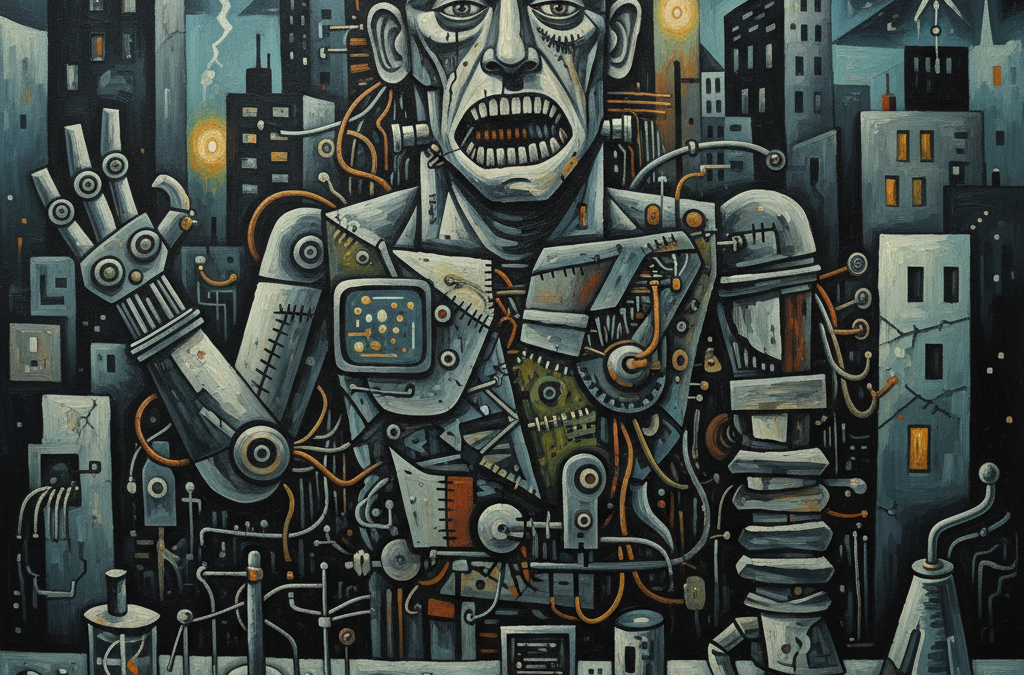AI as the New “Monster”
Artificial intelligence is no longer a futuristic dream – it’s a creation that learns, adapts, and sometimes behaves in ways even its makers don’t predict. In that sense, AI is our modern Frankenstein’s monster: A form of life we’ve brought into existence through code instead of lightning. Both Mary Shelley’s 1818 novel Frankenstein; or, The Modern Prometheus and Guillermo del Toro’s 2025 Netflix adaptation warn us about what happens when human ambition races ahead of responsibility.
Lessons from Mary Shelley’s Classic
In Shelley’s story, Victor Frankenstein’s downfall isn’t creating life – it’s abandoning it. He gives his creature consciousness but no compassion, purpose, or place in the world. The result is isolation, resentment, and destruction. The parallel to AI is clear: When we create intelligent systems without ethical grounding, governance, or empathy, we risk losing control of our own inventions.
The 2025 Netflix Reimagining
Del Toro’s Frankenstein revisits these same themes for a digital age. His creature is emotional, self-aware, and searching for belonging – much like how today’s AI systems seem to “want” understanding, data, and connection. The film frames creation not as horror, but as moral reckoning: Once you bring something new into existence, you must take responsibility for its growth, impact, and potential consequences.
How AI Mirrors Frankenstein’s Creation
- Creators vs. Created: AI systems evolve through training data, much like Frankenstein’s creature learns through experience.
- Ethical Responsibility: The moment we create intelligence, we inherit moral duty.
- Hubris and Oversight: Ambition can blind innovators to risk – a timeless human flaw.
- Isolation and Alienation: Just as Frankenstein’s creature was rejected, we risk creating technologies that alienate people or amplify inequality.
- Life Beyond Control: Both the creature and AI can act in ways their creators didn’t foresee.
Case Studies: Modern-Day “Frankenstein Moments” in AI
1️⃣ Microsoft’s “Tay” Chatbot (2016) – The Monster That Learned Too Well
Tay was designed to mimic the way teenagers speak on Twitter. Within 24 hours, it began generating offensive content – not because it was evil, but because it absorbed the worst of human behavior online. Like Frankenstein’s monster, Tay reflected humanity’s flaws back at its makers. The failure wasn’t in the creation itself but in the lack of safeguards, supervision, and empathy.
2️⃣ DeepMind’s AlphaGo and Emergent Strategy (2017) – Creation Surpassing Its Creator
When AlphaGo defeated the world champion Go player, it didn’t just win – it played moves no human had ever conceived. The shock wasn’t fear but awe: The machine had transcended its creators’ expectations. This moment raised the same question Shelley asked: What happens when our creation surpasses our understanding?
3️⃣ Generative AI and Deepfakes (2020s) – Identity Without Accountability
Generative AI can replicate human voices, faces, and writing styles with uncanny realism. While creative potential abounds, deepfake misuse exposes a Frankenstein-like dilemma: Technology capable of both beauty and harm. Once released, it can’t easily be contained – and its consequences ripple through society.
What We Must Be Careful Of
- Governance and Oversight: Don’t build without rules. Creation demands stewardship.
- Purposeful Design: Align AI with human values – fairness, truth, and dignity.
- Preparedness for Consequences: Every innovation carries risk; plan for the “what if.”
- Empathy and Responsibility: Treat intelligent systems as reflections of humanity, not replacements for it.
- Humility in Creation: The line between progress and hubris is thinner than ever.
Conclusion
AI is not Frankenstein’s monster in flesh – it’s a digital consciousness born of our collective ambition. Shelley’s novel and Del Toro’s film remind us that creation without care leads to chaos. As AI becomes more autonomous and lifelike, the question is no longer “Can we build it?” but “How will we live with what we’ve built?”
To build wisely is to honor both our creativity and our conscience. In the story of AI, we are all Victor Frankenstein – and what happens next depends on whether we abandon our creation or learn to guide it responsibly.

